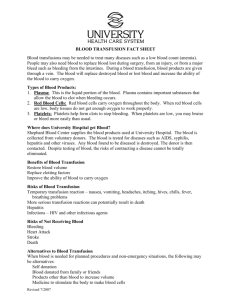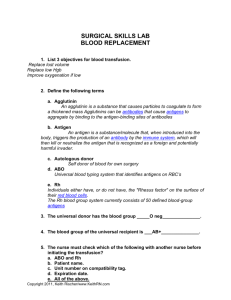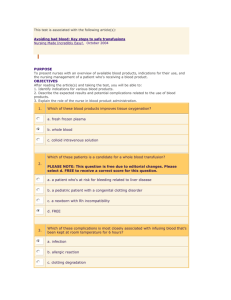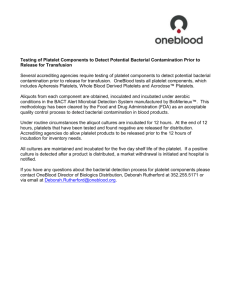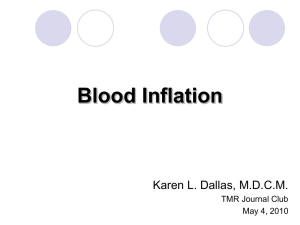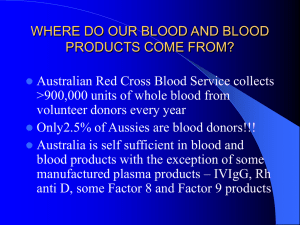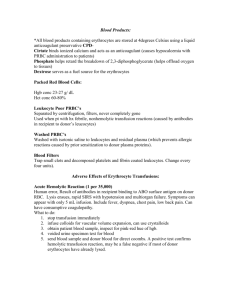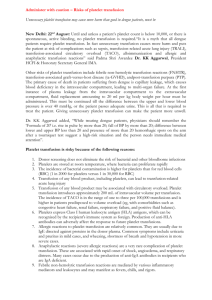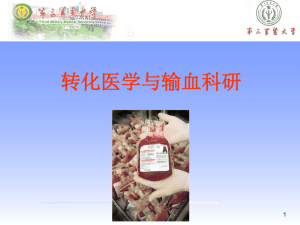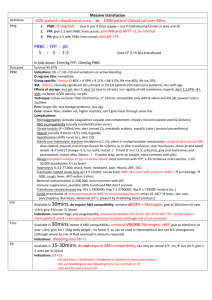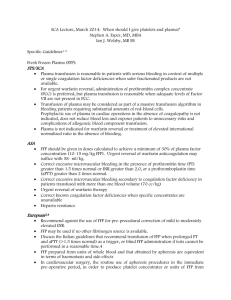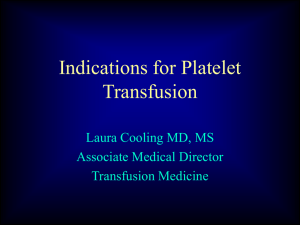Platelets Islam
advertisement
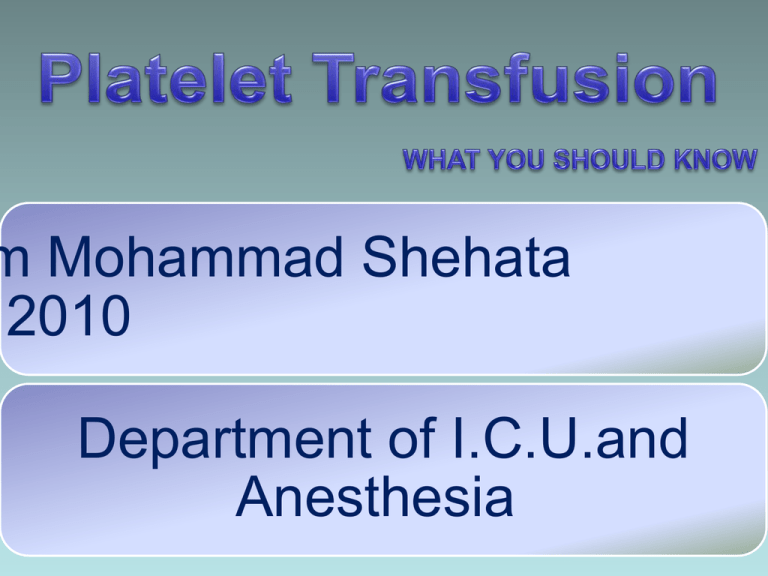
m Mohammad Shehata 2010 Department of I.C.U.and Anesthesia Platelets and hemostasis Preparation it is a long journey random donor Single donor Preparation centrifugation pheresis How much plt. Each unit donates: 55x109 /l in 40-70 ml plasma 300x109 /l in 200-400 ml plasma advantage to keep PH > 6.2 Increase count by 5x109/l In 70 kg person Increase by 30-50x109/l -Less costy -Only one donor -Less incidence of refractoriness, HLA typing -Available General considerationS : 1.Each unit contain(minimal) RBCs..what about -ABO incompatibility. - pediatric with small blood volume ( dose is…..) -RH negative receipient ( women of childbearing period ) 2. stored at (room temperature=20-24c) so a common complication is…. 3.Warming > 43c : impairs plt function. 4. Shelf life = 3-5 days, so there is finite supply. 5.Continous gentle agitation : prevent plt. Aggregates 6.Infusion through filter: not through the ordinary fluid infusion set : - Must be (170-260 micron filter). - not microaggregate filter (20-40m) : remove most of plt. 7.You should minimize the need for transfusion: ..investigate the cause of thrombocytopenia ..use adjunctive therapy(dialysis for renal failure… … IVIG for I.T.P….) ..Discontinue anticoagulant and antiplatelet therapy before surgery Def : platelet count < 150 000 causes Decreased production: B.M.suppression due to: Congenital Aquired : Viruses, sepsis, malignancy… Other causes : Dilutional : massive transfusion(1-1.5 bl.volume) Ratio of RBC: plt :FFP transfusion is 1:1:1 Distributional ; Congestive splenomegaly Increased destruction Non immune: D.I.C. Immune mediated: I.T.P. Post transfusion , drugs.. Heparin ( H.I.T.) Valporic acid,,carbamazepine penicillin / Beta lactam interferon Amiodarone,,digoxin Antiplatelet therapy a daily challenge Mechanism of action When to stop : risk /benefit Thienopyridine ( clopidogrel) Pt at low risk:7-10 days Pt at high risk : 5 days (platelet function test should be done) -Aspirin As long as the platelet life span(why..) Gp IIb/IIIa inhibitor: 1) Abciximab 2) aggrestat Evidence based indications Decision to tranfuse should not be based only on Plt. Count but should be supported by the need to prevent or treat bleeding ( always keep in mind) 1. prophylactic 2.Perioperative Ophthalmic surgery The trigger to avoid spontanous bleeding is < 10 000 not < 20 000 Chronic patient : + active bleeding When to redose ; Shorter life span =?? - <100 x 109/l (why) Neurosurgery Epidural insertion or removal… <50-80 x 109/l Lumbar puncture… < 50 x 109 /l Invasive (surgery as laparotomy …) vaginal delivery.. < 50 x109/ l Minimal invasive(..central line) < 30 x109/ l 1.Heparin induced thrombocytopenia. 2.Hemolytic uremic syndrome. No prophylactic transfusion because they are thrombotic Only treat clinical bleeding 3.Idiopathic thrombocytopenic purpura No benefit = quickly removed..( immunely destructed ) transfuse only before procedure or treat clinical bleeding -calculate the corrected count increment • Corrected count increment (CCI) = • (post-transfusion plt count – pre-transfusion • plt count) x (B.S.A.) / number of platelets transfused. accepted result : • -C.C.I. > 7.5 after 1 hour,,,or ,,. » -C.C.I > 4.5 after 24 hours. if not it is called….. Def : failure to obtain satisfactiory response after two consecutive transfusion episodes. Causes : • 1) Immune Platelet alloantibodies : -HLA -HPA 2) Non immune -sepsis -splenomegaly - D.I.C. -random donor platelet is more risky • -directly related to number of transfusion • • Dr.Colin Brown RISKS OF TRANSFUSION 1.T.R.A.L.I.( a phresis platelets is more risky) My own experience…it is a serious complication It is immune mediated non cardiogenic pulmonary edema Management: stop the infusion. supportive therapy. 2.transfusion associated sepsis ( stored at …..) It is the largest overall infectious risk in blood transfusion Platelets should be screened for bacterial contamination (specific concern) 3.Non hemolytic febrile reaction (incidence is 1:20) 4.Transmitted infections (H.I.V ,, H.C.V.) -My dear professors who • teach me -My dear colleagues who I • really love -My lovely parents and my • darling wife References 1-Update on platelets : ASA guidelines 2006 2-proposed guidelines for platelet transfusion ( Bc medical journal )
